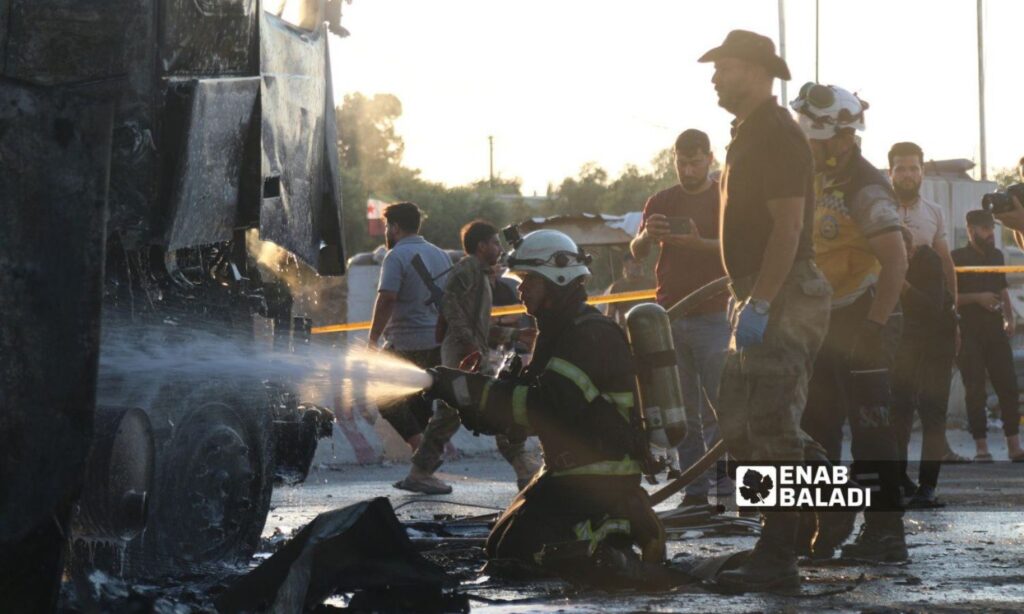On August 7, a car bomb (a refrigerated goods truck) exploded in Azaz, northern Aleppo, killing and injuring 21 people.
About a week after the Azaz explosion, an explosive device planted in a car exploded in Afrin, western Aleppo, reminiscent of the series of explosions that occurred in opposition-controlled areas in northwestern Syria, especially the part of Aleppo under the control of the Turkey-backed Syrian National Army (SNA).
An unknown object also exploded in the city of al-Bab in eastern Aleppo on July 14, killing several people.
The number of explosions has decreased since the beginning of 2023 compared to the previous three years.
Who benefits?
The Azaz and Afrin explosions came about a month and a half after the reactivation of Ankara-Damascus rapprochement and subsequent efforts by the Syrian Democratic Forces (SDF) to show their readiness for dialogue with various parties.
Despite the SDF’s statements about their readiness for dialogue with the Syrian opposition and their internal reform steps that had been neglected for six years, they have not stopped their attacks on the Syrian National Army points, rather, they intensified them in July and August.
Bassam al-Suleiman, a researcher at the Jusoor for Studies Center, suggested that these explosions are messages from the SDF indicating that they “can destabilize the north.”
He told Enab Baladi that regime cells cannot be ruled out either, as they benefit from pressuring areas with Turkish forces to convince Ankara that their stay will be costly, thus responding to its demands for setting a timetable for withdrawal.
The Azaz explosion on August 7 resulted in the death of nine people, some of whose bodies were burnt, and injured 12 others, including critically. Additionally, the explosion burned seven motorcycles and three pickup trucks.
The Syrian Islamic Council condemned the bombing in a statement, and the subsequent rocket attack from the SDF on the explosion area.
The council said that such violations that destabilize the security of liberated areas only serve the interests of the “criminals of the criminal Syrian regime and the separatist terrorist militias of SDF.”
The Afrin explosion on August 14 did not result in any civilian casualties.
In the city of al-Bab, a civilian was killed and five others, including a child, were injured (all seriously) from the explosion of an unknown object in a closed truck (a refrigerator) transporting vegetables on July 14, during the unloading of potato sacks from the vehicle.
A car bomb explosion targeted the main market of Azaz on March 31, during the rush hour for Eid shopping, killing three civilians (two children and a woman) and injuring five others, including a child.
According to statistics obtained by Enab Baladi from the Syria Civil Defence (White Helmets), the defense teams responded to two car bomb explosions in northwestern Syria during 2023.
The two explosions resulted in the death of five people and injured seven others, while the teams also responded to three motorcycle bomb explosions, resulting in the death of three people and injuring seven others.
Northwestern Syria witnessed 29 IED explosions, three motorcycle bombs, 18 unknown explosions, and 15 landmine explosions in 2022.
In 2021, the Civil Defence responded to 177 unknown explosions, and IEDs and car bombs causing the death of 91 people, including 15 children and seven women, and injured 300 people, including 55 children.
Security reasons
Researcher Bassam al-Suleiman pointed to reasons related to security flaws within the National Army and security apparatus exploited by the SDF or even the regime, despite the development of these devices in recent years and their ability to detect and thwart many bombing operations.
Economic and social gaps, such as the spread of poverty, unemployment, the lack of social justice, and the ongoing injustices faced by the Kurdish component in some areas of Afrin and its countryside, also aid the SDF and even the regime in recruiting cells to carry out such operations.
On the other hand, the SDF intensified its attacks on areas controlled by the Syrian National Army, with clashes occurring between the two sides eight times on various fronts in rural Aleppo since July 15, according to observations by Enab Baladi on Telegram.
The National Army factions also announced repelling nine infiltration attempts and their points being attacked twice, one with a guided missile killing two fighters and another with rocket launchers during the same period.
A child and a woman were injured on August 2 while on the bridge connecting Shyoukh town and Jarablus city in eastern rural Aleppo after being shot from the left bank of the Euphrates River controlled by the SDF and the regime.
The SDF does not usually announce these attacks, while it talks about Turkish artillery shelling or Turkish drone targeting its forces.
The SDF ignored the attacks and clashes with the National Army since mid-July, except for an attack they launched on July 17 in Khirbet al-Shair village in the Zarkan area in rural al-Hasakah, where three National Army fighters were killed and two others injured.











